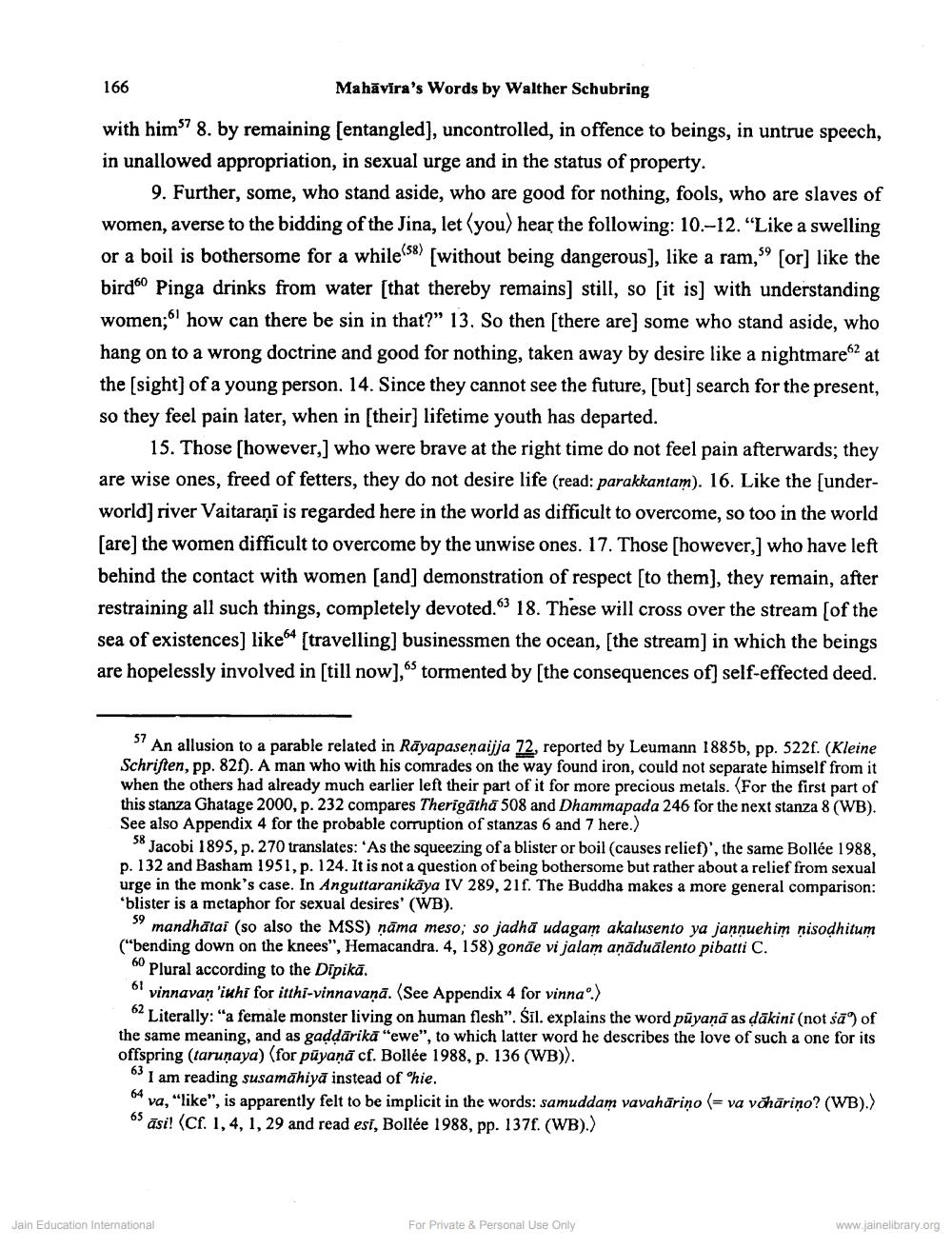________________
166
Mahavira's Words by Walther Schubring
with him" 8. by remaining [entangled), uncontrolled, in offence to beings, in untrue speech, in unallowed appropriation, in sexual urge and in the status of property.
9. Further, some, who stand aside, who are good for nothing, fools, who are slaves of women, averse to the bidding of the Jina, let (you) hear the following: 10.-12. "Like a swelling or a boil is bothersome for a while(s) [without being dangerous], like a ram," [or] like the bird Pinga drinks from water [that thereby remains] still, so [it is] with understanding women; how can there be sin in that?" 13. So then [there are] some who stand aside, who hang on to a wrong doctrine and good for nothing, taken away by desire like a nightmare" at the [sight] of a young person. 14. Since they cannot see the future, [but] search for the present, so they feel pain later, when in [their] lifetime youth has departed.
15. Those [however,] who were brave at the right time do not feel pain afterwards; they are wise ones, freed of fetters, they do not desire life (read: parakkantam). 16. Like the [underworld] river Vaitaraņi is regarded here in the world as difficult to overcome, so too in the world [are] the women difficult to overcome by the unwise ones. 17. Those [however,] who have left behind the contact with women [and] demonstration of respect [to them], they remain, after restraining all such things, completely devoted." 18. These will cross over the stream [of the sea of existences] like [travelling] businessmen the ocean, [the stream] in which the beings are hopelessly involved in [till now]," tormented by [the consequences of] self-effected deed.
57 An allusion to a parable related in Rayapaseṇaijja 72, reported by Leumann 1885b, pp. 522f. (Kleine Schriften, pp. 82f). A man who with his comrades on the way found iron, could not separate himself from it when the others had already much earlier left their part of it for more precious metals. (For the first part of this stanza Ghatage 2000, p. 232 compares Therīgāthā 508 and Dhammapada 246 for the next stanza 8 (WB). See also Appendix 4 for the probable corruption of stanzas 6 and 7 here.)
58 Jacobi 1895, p. 270 translates: 'As the squeezing of a blister or boil (causes relief)', the same Bollée 1988, p. 132 and Basham 1951, p. 124. It is not a question of being bothersome but rather about a relief from sexual urge in the monk's case. In Anguttaranikaya IV 289, 21f. The Buddha makes a more general comparison: 'blister is a metaphor for sexual desires' (WB).
59 mandhatai (so also the MSS) nama meso; so jadha udagam akalusento ya janṇuehim nisoḍhitum ("bending down on the knees", Hemacandra. 4, 158) gonãe vi jalam aṇāduālento pibatti C.
60 Plural according to the Dipika.
61 vinnavan 'iuhi for itthi-vinnavaṇā. (See Appendix 4 for vinna.)
62 Literally: "a female monster living on human flesh". Sil. explains the word puyaṇā as ḍākini (not sā) of the same meaning, and as gaḍḍārikā "ewe", to which latter word he describes the love of such a one for its offspring (tarunaya) (for puyaṇa cf. Bollée 1988, p. 136 (WB)).
63
"I am reading susamāhiyā instead of hie.
64 va, "like", is apparently felt to be implicit in the words: samuddam vavaharino (va vähärino? (WB).) āsi! (Cf. 1, 4, 1, 29 and read esi, Bollée 1988, pp. 137f. (WB).)
65
Jain Education International
For Private & Personal Use Only
www.jainelibrary.org




